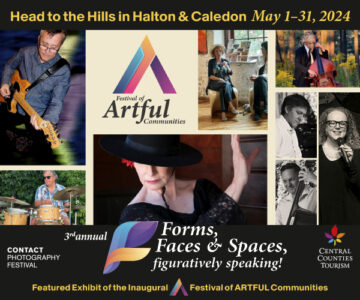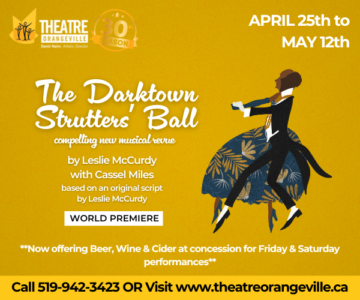Opera 101
Opera singing is a taxing physical feat, requiring a strong diaphragm, great lung power and breath control, and healthy vocal cords.
Do you think of opera as glorious and soul-stirring, or does the very word intimidate you? Are you at ease with terms such as aria, libretto and bel canto – or simply bewildered?
It’s true that opera is a multilayered art form that can require some commitment to understand and enjoy. It can also take some stamina – a performance can last up to three hours. But the form has never been so accessible.
This fall and winter, Galaxy Cinemas in Orangeville is once again presenting a series of Saturday afternoon operas through The Met: Live in HD program. This is the 13th season New York’s famed Metropolitan Opera has simulcast its performances around the world. Since the first simulcast in 2006, interest has skyrocketed, and the performances can now be seen in more than 2,200 venues in 70 countries.
If you haven’t yet ventured to see the local offerings, this may be the year to open yourself to what could be an exhilarating new experience. To set the stage, we spoke with some local opera aficionados to get their take on how to discover the joy of the art form.
At 47, Alexandra Lennox is anything but the stereotype of an opera singer. Petite and outgoing, as a kid she was always putting together shows in the family garage, nagging her friends to take part. Of course, she chose the music and was the director and star. Dance and vocal lessons became part of her life, and she eventually set her sights on a career on Broadway.
But when it was discovered Alexandra was a coloratura soprano, a style of singing distinguished by agile and flamboyant leaps, runs and trills in high register, the celebrated soprano and director Eleanor Calbes of Mississauga took on the young teenager as a student. Alexandra, who just began her 21st year in the chorus of the Canadian Opera Company, credits the late Calbes with nurturing her talent and instilling the discipline required of an opera singer.
“Toronto’s COC is an ‘A’ house,” says Alexandra, “which means there are lots of different productions, lots of performances and big budgets, allowing the company to hire the best people in the business from all over the world. We do many of the same productions as the New York Metropolitan Opera House.
“Because opera is a multifaceted art form, which includes orchestral and choral music, the libretto [words] and solo vocal lines, plus choreography, costumes, scenery and lighting, it is the best of the best in theatre.”
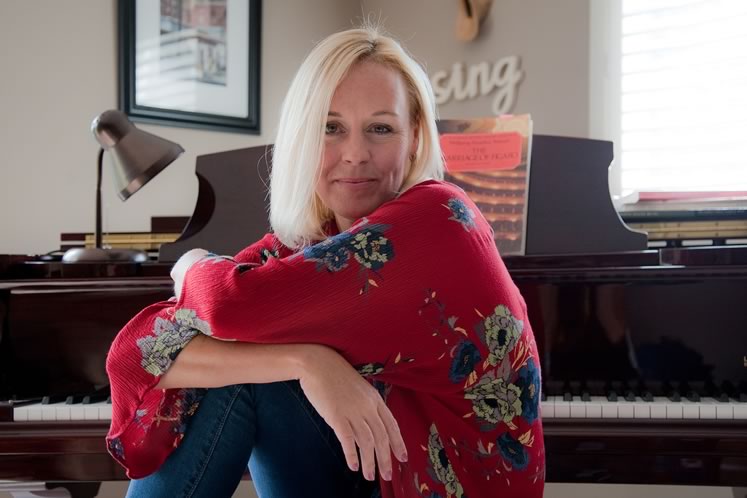
Soprano Alexandra Lennox has been a member of the chorus of the Canadian Opera Company for two decades: “Opera today is not at all like it was in our grandparents’ era.” Photo by Rosemary Hasner / Black Dog Creative Arts.
And fortunately, says Alexandra, contemporary directors no longer need to deal with many of the restrictions they faced in the past. “There was a time when the Church or political doctrines dictated what could and could not be seen in a theatre,” she says. “Happily, those days are behind us.”
This fall, Alexandra is looking forward to performing in the COC’s world premiere of Hadrian, a new work by American-Canadian singer, songwriter and composer Rufus Wainwright. Hadrian was arguably Rome’s greatest emperor and yes, the guy responsible for building that wall across Britain. The story is set at the end of the classical era of Roman history and outlines the influence of Greek ideas in changing Rome’s political landscape. The libretto, by Daniel MacIvor, deals with power, magic, death, homosexuality and love.
And a bonus: Hadrian is in English.
One of the knocks on classical opera is that it is often sung in Italian, German or another language, a result of the art form’s European origins. In 1983, Toronto’s opera house was the first in the world to use surtitles, projecting the English translation of the libretto above the stage.
To sing in a foreign language, Alexandra has familiarized herself with the International Phonetic Alphabet, but her many years of performing in another language mean she can also carry on conversations in Italian, German and French. “As long as the conversation deals with popular operatic themes such as lying, greed, ego, sex and death, I’m good to go,” she says.
Later in the season, Alexandra will perform in Atom Egoyan’s production of Wolfgang Amadeus Mozart’s Così Fan Tutte. This is the second time the COC has called on the renowned Canadian filmmaker, who branched into opera in the mid-1990s, to stage Mozart’s lighthearted examination of love and betrayal.
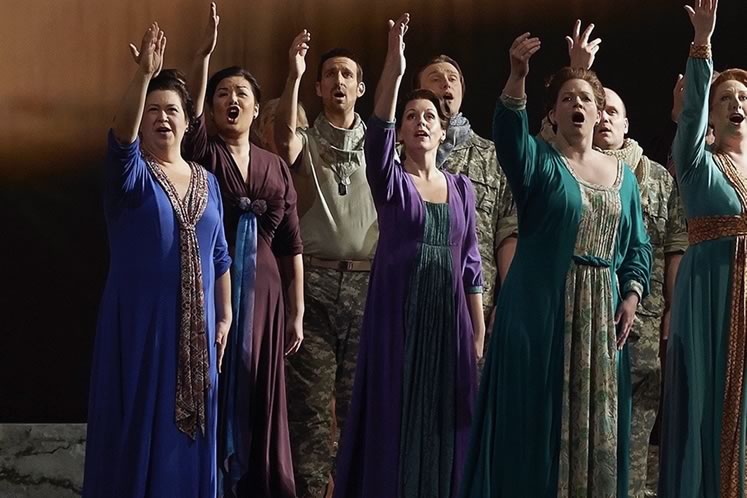
Alexandra Lennox (centre) in the Canadian Opera Company’s 2014 production of Handel’s Hercules. Photo by Michael Cooper.
Alexandra also runs a voice studio in Orangeville, where she teaches students not only the details of the art form, but also the techniques of amplification. She looks for students with a good ear, who can sing in tune, and who demon-strate basic musicality, which she defines as “having a feel for music.” She says she thinks of her students as gems on their way to becoming diamonds.
If the Galaxy series piques your interest in opera, Alexandra suggests you round up some friends (perhaps the book club) or book a date night with your partner, and plan an evening to see the real thing on the COC stage at Toronto’s Four Seasons Centre for the Performing Arts. Perhaps even hire a limo.
You can make it a fancy dress event, but you don’t have to, Alexandra notes. “Opera today is not at all like it was in our grandparents’ era. Our job as performers is to entertain the audience. Opera is no longer elitist. Where once the dress was tux and ball gown for audience members, jeans and a clean shirt will now do just fine.”
And the night won’t necessarily be as expensive as you might expect. Though a premium seat for the entire COC season of six operas can set you back more than $2,000, there are also great deals to be had. Seats farther from the stage can go for as little as $199 for the season, and the company offers special prices for seniors, youth and the under-30 crowd. Youth and those younger than 30, for example, can attend a single performance for as little as $22 – much less than the cheapest ticket to a stadium rock concert.
If you’re still hesitating, the Met cinema series is a great way to dip your toe into opera before you fully commit – lest you end up like famous opera curmudgeon Mark Twain. During a big night at the opera, he is reported to have said, “I am sure I know of no agony comparable to the listening to an unfamiliar opera.”
But don’t be dissuaded by Mr. Twain before you give it a try. Note he said “unfamiliar” opera. Those in the opera know strongly suggest opera goers spend a bit of time researching the production they are about to see.
Patti Powell, who has worked as a choreographer, director and writer in the fields of opera, theatre and dance for more than 20 years, suggests a first step is to learn something about the story.
Doing a little research is no more onerous than checking online movie reviews for a plot synopsis, running time and names of performers. And even if you’re a last-minute person, the program handed out as you take your seat should get you up to speed.
Patti also suggests listening to some opera before you go. When she is at home in Mono, her radio is always tuned to CBC Music’s Saturday Afternoon at the Opera.
Here in Headwaters, says Patti, we are fortunate to live so close to the quality productions offered by the COC, the largest opera company in Canada, and among the largest in North America.
Patti’s husband, Tim Albery, is a freelance opera director – a rarefied profession. “Let’s say the Canadian Opera Company decides to do Tosca,” she explains. “The first step is to choose a director. There are about 30 working opera directors worldwide, so it may take up to three years for the schedule of the chosen director to open up.” She notes some opera fans travel the world to follow the work of a specific director or singer because they admire the vision that person brings to a production.
“The director hires the production team, which consists of a set designer, a costume designer, a lighting designer and a choreographer, if needed. The musical director is responsible for finding the singers.” The director and musical director then work together to bring their vision to the stage.
Patti points out that just as our physical appearance changes as we mature, so too does our perspective: “An opera seen at the age of 20 may be quite a different experience when seen again at 50 because the way we view the world has probably changed.”
“Opera really is theatre where music has the leading role,” says soprano Natasha Campbell, who grew up in Caledon but now lives in Kitchener with her conductor husband, Mark Vuorinen, artistic director of the Elora Festival and the Elora Singers. “It’s a beautiful vehicle of expression that demands not only the natural gift of the voice but also plenty of hard work.”
Opera singing is a taxing physical feat, requiring a strong diaphragm, great lung power and breath control, and healthy vocal cords. The goal of an opera singer is to combine beauty of tone and expressiveness with an accurate reflection of the written musical score, all while projecting the voice so it reaches far beyond the orchestra and into the back row of the third balcony.
Natasha adds that, as a composite art form, opera “intends to put drama on musical wings by allowing several means of communication to reach you in whatever way they do, spiritually or intellectually, or perhaps both.”
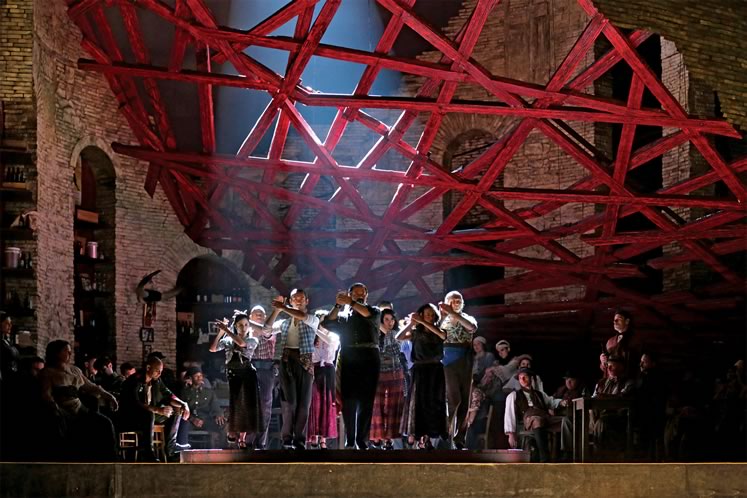
A scene from the Metropolitan Opera’s production of Carmen. Photo courtesy Metropolitan Opera.
But just as it makes sense to start swimming lessons in the shallow end, for opera beginners it makes sense to tackle opera appreciation thoughtfully and in increments. It is probably not wise to begin your journey into the opera world with Richard Wagner’s Ring Cycle, which entwines themes of love, greed and violence, encompasses four operas, and is customarily performed over six days.
Fortunately, the Met season at Galaxy Cinemas launches with a proven a crowd pleaser: Giuseppe Verdi’s Aida, an opera rife with familiar arias and orchestral pieces you will recognize even if you weren’t consciously aware you knew them. The most notable of these may be the show-stopping “Triumphal March.”
Asked which of the Galaxy offerings she would most recommend for the neophyte, Alexandra says, “They are all hits, and all beautiful, but if I had to choose three, they would be Aida, Carmen and La Traviata. They are the most accessible – easy to listen to, and people will recognize the music. They’re great for first-time opera goers. And of course, special mention for The Magic Flute because it’s one to take the little ones to.”
Opera may be a little like cilantro – either you love it or hate it. But you won’t know unless you give it a try. And who knows? An interest kindled might eventually lead to a lifelong passion.
Saturday Afternoon at the Opera in Orangeville
Galaxy Cinemas Orangeville will screen 11 live perform-ances from New York’s Metropolitan Opera House during the 2018–19 season of the The Met: Live in HD. The simulcasts feature on-screen English subtitles, and during intermissions, behind-the-scenes extras such as interviews and short docs. Tickets are $28, with a slight reduction in price for seniors and children aged 3 to 13. Package pricing is also available. All performances start at 12:55 p.m., except as noted.
Aida
by Giuseppe Verdi
October 6, 2018
Samson et Dalila
by Camille Saint-Saëns
October 20, 2018
La Fanciulla del West
by Giacomo Puccini
October 27, 2018
Marnie
by Nico Muhly
November 10, 2018
The Magic Flute
by Wolfgang Amadeus Mozart
December 1, 2018
An abridged revival version especially for Christmas and kids!
La Traviata
by Giuseppe Verdi
December 15, 2018
Adriana Lecouvreur
by Francesco Cilea
January 12, 2019
Carmen
by Georges Bizet
February 2, 2019
La Fille du Régiment
by Gaetano Donizetti
March 2, 2019
Die Walküre
by Richard Wagner
March 30, 2019 at 12:00 noon
Part II of the Ring Cycle.
Dialogues des Carmélites
by Francis Poulenc
May 11, 2019 at 12:00 noon
An Opera Lexicon for Beginners
Because of opera’s origins in Italy, most common operatic terms are borrowed from Italian. Indeed, the term opera itself is an Italian word that means simply “work” – in the sense both of the labour completed and the result produced.
ARIA
an accompanied song for solo voice
LIBRETTO
the text of an opera (the term is a diminutive of libro or “book”)
BEL CANTO
a lyrical style of singing; literally “beautiful singing”
ORATORIO
a religious work usually performed in churches
OPERETTA
a short opera, usually on the light side (another diminutive, this time of opera)
OPERA VERISMO
a re-enactment of real life (verismo refers to realism or truth)
OPERA SERIA
a serious opera, stately and formal
OPERA BUFFA
a comic opera (buffa is related to the English word buffoon)
OPÉRA COMIQUE
a form that originated in France and includes both spoken dialogue and singing but is not necessarily opera buffa; similar to a contemporary musical production
GRAND OPERA
a lavish production that includes huge crowd scenes portraying events such as coronations, weddings and wars
A Potted History of Opera
The opera format has been with us for nearly 450 years. The story goes that Giovanni de’ Bardi, from the cream of Florentine society, and a group of intellectual friends grew tired of attending formal evening entertainments that were, at the time, a mishmash of non sequiturs – a bit of dance, followed by a bit of poetry, followed by a bit of singing, then a scene from a play, then more dance. The evenings were disjointed, shabbily performed, often boring and long-winded, and ultimately disappointing.
Giovanni and his friends looked for a format with a cohesive plot. The recitative style was introduced – a performer would deliver a line of text in the vernacular, but in song rather than by speaking – and the early dramatic form of opera was born. This would develop through the decades and centuries, with each generation adding layers of richness and tradition.

